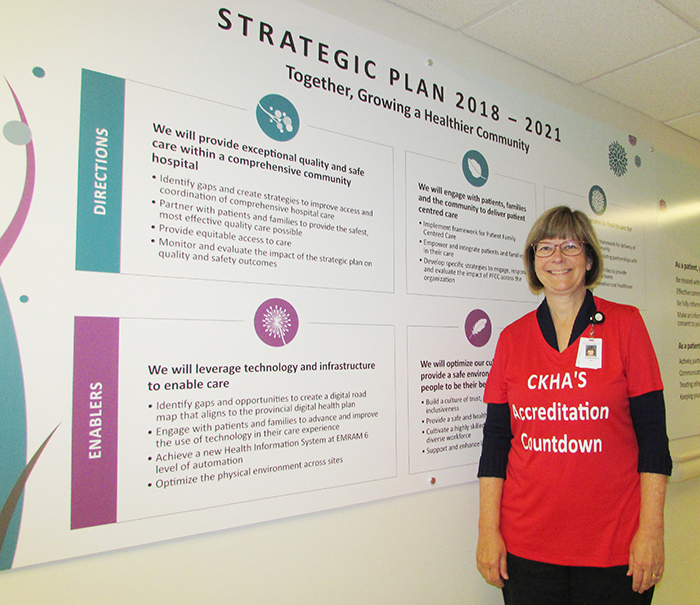
Bc
There are some unfamiliar faces on the prowl in the halls and offices of the Chatham-Kent Health Alliance this week, as Accreditation Canada has sent a team in to evaluate operations at our local hospitals.
Lori Marshall, president and CEO of the Chatham-Kent Health Alliance, said four surveyors are on site this week, spending five days reviewing essentially all elements of the CKHA.
“It gives you a chance to look at policies, practices, relationships, etc.,” she said. “We performed a self-assessment to identify areas where we believe we meet and exceed provincial standards, and areas that need improvement. The surveyors come in to verify.”
There are more than 1,000 standards that will come under scrutiny this week, from the boardroom to patient experience to the boiler room, Marshall said.
It’s a continuing focus on striving to constantly improve, she added.
“They help to identify some of the gaps,” she said of the surveyors, who are comprised of hospital administrators and front-line health-care providers.
The feedback will be immediate.
“We’ll get a preliminary verbal report at the end of the week and get a formal report within 60 days,” Marshall said.
While the accreditation process is not mandatory, she said she doesn’t know of a hospital that doesn’t take part.
There’s an annual cost to be involved, Marshall said, as Accreditation Canada provides other services and access to resources. Plus, when it’s survey week, there are additional costs associated with the weeklong visit.
“We believe it’s highly beneficial to do that,” Marshall said.
Jerome Quenneville, vice president and chief financial officer with the CKHA, said in order to have medical students work at a hospital, it has to be part of the accreditation process, and is therefore vital to the physician recruitment process.
In terms of financial prudence, Marshall said the CKHA continues to project it will be in a balanced position at the end of its fiscal year, despite some challenges with provincial funding.
She said the funding model helps small hospitals, as regardless of patient numbers, you need a certain core level of service.
But the alliance is considered a mid-size hospital, one of the largest in that category. Large urban hospitals perform high volumes of procedures to the point they can do them more efficiently and cost effectively, plus they benefit from population growth.
But the alliance doesn’t, and as a result doesn’t get the same level of support funding from the province.
Marshall is hopeful the provincial funding model will be tweaked somewhat in the near future.
One area in which the CKHA is doing more procedures is knee replacements. It used to receive provincial funding to perform 381 replacements a year, but it is now bumped to 481 such procedures that the Erie-St. Clair Local Integrated Health Network is funding each year.
“Our wait list is longer than we’d like, but that’s a tribute to the success of our surgeons, as we’re drawing patients from outside our area,” Marshall said of joint replacement wait times and the local orthopedic surgeons.
•••
In other CKHA news, Marshall said a recent mock disaster went well.
“It was a Code Orange, an external disaster. The ER needs to be prepared for the patients coming in, and shift out into the rest of the hospital,” she said. “Our staff – it was like a well-orchestrated ballet. It is incredible how everyone knows exactly what to do.”
•••
Levels of staff satisfaction at the CKHA are on the rise. A year ago, a survey showed poor results, but Marshall said this time around, they’ve seen a great deal of improvement in every element, but there is “still much work to do.”
•••
Plans to replace the power plant at Sydenham campus in Wallaceburg continue, Quenneville said. The CKHA is working with the municipality and the province, and he hopes the job will go out to tender before the end of the year.






